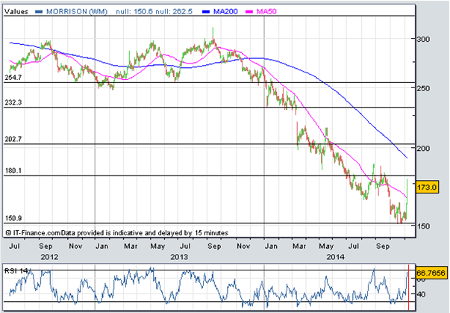Is Morrisons worth chasing higher?
6th November 2014 12:04
With a vicious price war underway and supermarket profit warnings dropping like confetti, this year was never going to be easy for . And sales in the third-quarter continued to fall, but the grocer is confident about the full-year and has narrowed the likely range of outcomes for profits. We repeat our thoughts first shared in September, that this is "more promising stuff," and Morrisons looks like a better bet than right now.
True, sales fell by 3.6% in the 13 weeks to 2 November, or 5.6% including fuel, and like-for-like sales fell by 6% and 8.3% respectively. That is pretty grim, but initiatives will take time to work through, and there is at least progress being made against other measures.
A 2.4% drop in items per basket year-on-year was much better than the 6.9% decline seen at the end of the last financial year. It's pumping millions into price cuts - £1 billion is available over the next three years - and in a unique selling point promises to price match the discounters Aldi and Lidl as well as Tesco, Sainsbury's and Asda. Morrisons' price card "is already proving extremely popular with customers,” we're told.

"We now expect underlying profit before tax to be in the narrower range £335-£365 milllion (previously £325-£375 million), after £65 million of new business development costs and £70 million of one-off costs," says the food retailer.
There's been progress with a better IT platform, simplifying its range and streamlining packing facilities, too. Year-end net debt will also be about £100 million lower than previously thought at £2.3-2.4 billion, at least £400 million lower year-on-year.
"We are making good progress on all components of the plan we set out in March, and remain confident that we will generate £2bn of cash and £1bn of cost savings over three years," says the company.
Morrison trades on a rather pricey 14 times forward earnings, and although analysts at Deutsche Bank think it will cut the dividend - from 13p last year to 8.61p in the 12 months to January 2015 - the yield would still register at almost 5%.
"There is a real possibility of a more cautious dividend policy," admits Barclays. "We do not see this quarter as a turning point per se - although we should be mindful that comps do get 3.3ppts easier in the final quarter of the year."
That prospective payout should lend support to the share price. If it did maintain the dividend at 13p, however, the yield surges past 7%.
This article is for information and discussion purposes only and does not form a recommendation to invest or otherwise. The value of an investment may fall. The investments referred to in this article may not be suitable for all investors, and if in doubt, an investor should seek advice from a qualified investment adviser.
Editor's Picks